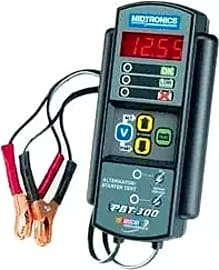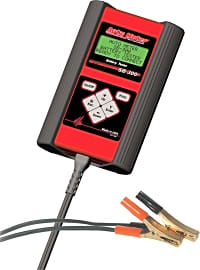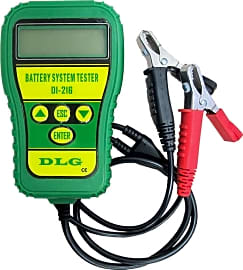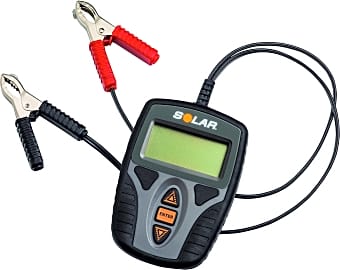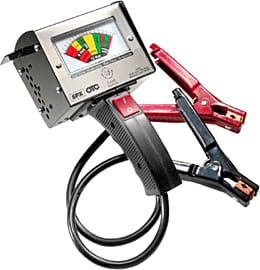The 9 Best Auto Battery Testers

This wiki has been updated 35 times since it was first published in May of 2016. Whether you are having difficulties getting your car or boat to start, or you just like to preempt any problems, these auto battery testers are capable of providing a complete system diagnosis, including testing the load, the starter motor draw, and the battery's overall health, so you know if it is near the end of its life. Electrical systems are dangerous, though, so use caution to avoid injury. When users buy our independently chosen editorial selections, we may earn commissions to help fund the Wiki.
Editor's Notes
June 11, 2021:
You can go a couple different ways when looking for a battery tester. The Midtronics PBT300 and Foxwell BT705 are popular in shops because of the comprehensive and customizable nature, which make them especially versatile. Alternatively, models such as the OTC 3181 and Schumacher BT-100 don't offer any kind of programming and simply take readings. While they're not quite as versatile as others, they rely on premium build quality and calibration, and can be important parts of a commercial outfit's toolkit.
Aside from the removal of a generic model that was out of stock, we haven't changed any recommendations recently.
January 02, 2020:
Removed the QuickLynks Cold Cranking because of quality concerns. Replaced it with the DLG DI-216 whose quality is surprising given that it is quite affordable. One common problem with many of the auto battery testers is the quality of the leads. At worst, they'll have some discontinuity and fail to connect at all. Often they won't make good contact with the terminals given their shape. Therefore, when choosing your battery tester, consider whether the leads are replaceable (so you can swap them out for better leads) or if they are not, whether the ones included will last.
Our top picks reflect this concern as the Foxwell BT705, the Midtronics PBT300, and the Clore Automotive BA327 all come with excellent leads with good insulation. If you're really on a budget and you need to pick up a tester with low quality leads like the Motopower Voltmeter, it's not the end of the world that they are not replaceable. You can always cut them off at the clip and splice in replacements.
Electrical circuits are dangerous and should only be worked on by trained technicians to avoid personal injury or damage to equipment.
How Battery Testers Work
The more waves given off, the more life left in the battery.
There's nothing worse than going to start your car and having the engine not even try to turn over. That's why a battery tester can come in handy, as it can give you a heads-up as to when your battery might be on its last legs before you make that afternoon drive across Death Valley in July.
Many modern digital testers require you to enter basic information about the battery before testing, such as its capacity. This gives the device a basis for telling you whether the test is a pass, fail, or re-test. However, many old-school testers simply use a needle on a dial to tell you the health of the battery. Luckily, neither version is very complicated, and each will give you a basic answer, so there's not a lot of room for misinterpretation.
Most testers are what's known as analog testers, which means they measure the battery under load. Basically, they complete the circuit on the battery, allowing electricity to flow through it. This creates both voltage and current, which in turn give off electromagnetic waves. The more waves given off, the more life left in the battery.
These testers are very simple and extremely accurate. They look like jumper cables, and you hook them up to the posts on the battery in a similar fashion. Once hooked up, all you have to do is look at the readout to see how your battery is feeling at that time. It's not as fun as hooking up jumper cables, though, because it's harder to pretend to be Dr. Frankenstein and yell, "Give me life!" in the parking lot at Target.
Digital testers, on the other hand, draw power from the battery. They then measure the amount of power they're able to siphon off, and give you a reading based on that. This is much less accurate, but good enough if you're just interested in knowing whether the battery will start for the rest of the day or not. Also, because they suck juice from the battery, you don't have to worry about the tester going dead on you.
How To Stay Safe While Working On Your Battery
Car batteries are pretty phenomenal feats of electrical engineering, as they're basically big blocks of electricity-on-demand. However, it's important to remember that electricity has one goal, and that is to kill you, so keep safety in mind whenever you're messing around under the hood.
Car batteries are pretty phenomenal feats of electrical engineering, as they're basically big blocks of electricity-on-demand.
However, the danger of getting shocked is very low (especially if the battery's dead). That doesn't mean that batteries aren't still dangerous, however. Batteries give off hydrogen gas while charging, and hydrogen just happens to be flammable. That means that, if a spark occurs (while hooking up jumper cables, for example), it can cause the battery to explode. Also–hopefully this goes without saying–but don't smoke while working on your battery.
Beyond the fact that explosions are generally undesirable when working on cars, having a battery blow up is especially bad, as they are filled with battery acid. Acid doesn't like skin or eyeballs, so definitely wear safety goggles, gloves, and a long-sleeve shirt. The acid should be safely contained, but never tip the battery over or hold it upside down, and be especially careful if the casing is cracked.
Another thing to be on the lookout for is a rotten egg odor. If you smell that, get to a well-ventilated area immediately, as the battery has been over-charged and is giving off hydrogen sulfide. If you're stuck in an enclosed area with the gas, it can kill you. This is more of a danger with older, lead-acid batteries, but it's good to know regardless. Also, if you smell rotten eggs in any capacity and your instinct is to stick around and breathe in deeply, it may be time to re-evaluate some life choices.
Despite all these dire warnings, modern batteries are pretty safe to test and replace. However, keep in mind that there hasn't been a safety protocol invented yet that can overcome boundless human stupidity, so stay safe and be smart while doing anything under the hood.
How to Get More Life Out of Your Battery
Car batteries are designed to last anywhere from 2-6 years with regular use. Now, that's a pretty wide disparity in lifespan, and it's how you treat your battery that will go a long way towards determining how much use you get out of it.
The primary limiting factor on battery life is the weather. Batteries get hot anyway, and if you add in a 100° day on top of that, you're going to drain it faster. So, if you live in Phoenix, consider moving literally anywhere else. If that's not feasible, however, be sure to park in the shade, and try to limit your driving when it's a scorcher out.
Batteries get hot anyway, and if you add in a 100° day on top of that, you're going to drain it faster.
Also, as you might expect, having a bunch of accessories constantly drawing juice can shorten its lifespan as well. This is especially true when the car's merely idling, so if you're waiting in a parking lot for someone, consider turning off the air conditioner and radio.
Short rides are a much bigger drain on the battery than longer ones, especially if you're making frequent stops and turning the car on and off every time. This likely isn't something you can avoid completely, but just be cognizant of it and try to limit it as much as possible.
Of course, leaving your lights on after you turn the car off is another no-no. You likely already know this if you've ever come back to find a dead car waiting in the parking lot, but it's still easy to forget. Get in the habit of doing a once-over every time you exit the vehicle, making sure all interior and exterior lights are off. If you have small children, you can check to make sure you remembered to get them as well, but turning off the lights is what's really important.
And finally, one of the best things you can do for your battery is test it often. While this won't actually extend its lifespan on its own, it will give you a good idea of its overall health, and alert you to any needed changes if your driving habits are putting a strain on the battery. You'll also be aware of when it's getting close to kicking the bucket, so you can have a spare battery on hand when that sad day finally comes.
Basically, a battery is like a date: if you're nice to it, it's a lot less likely to leave you stranded on the side of the road.


